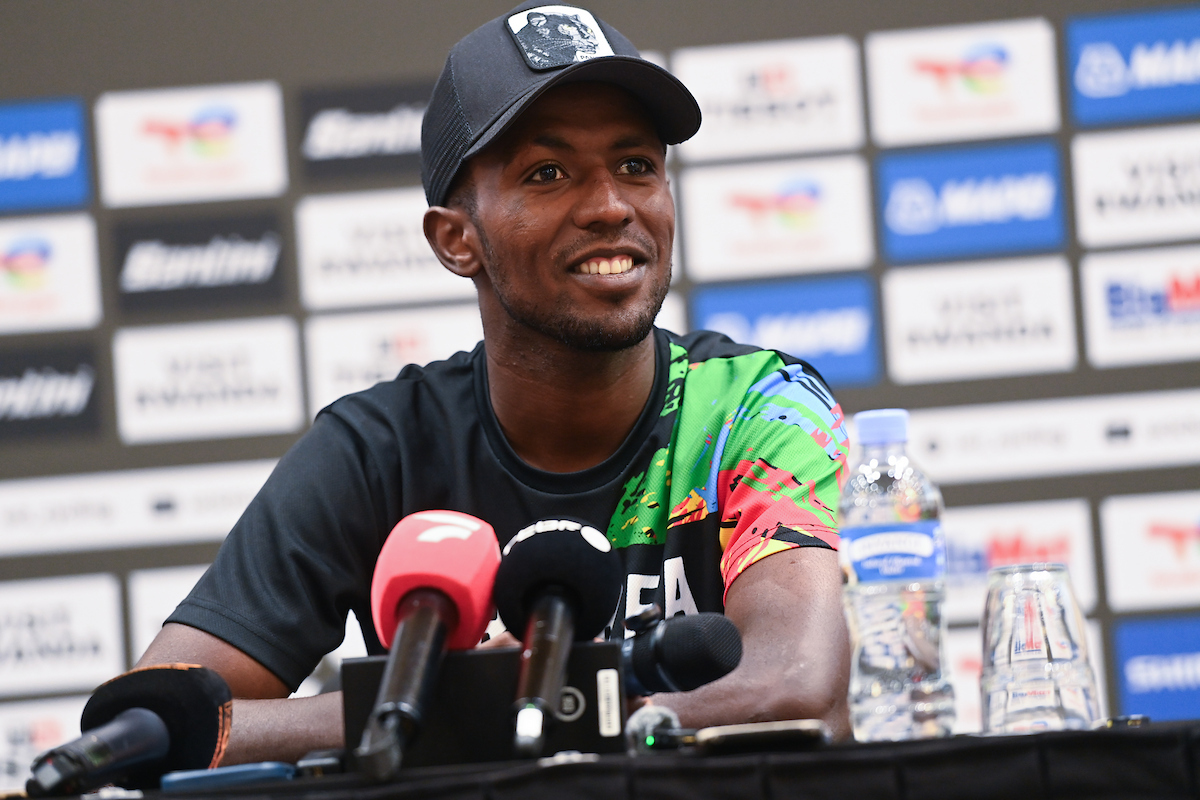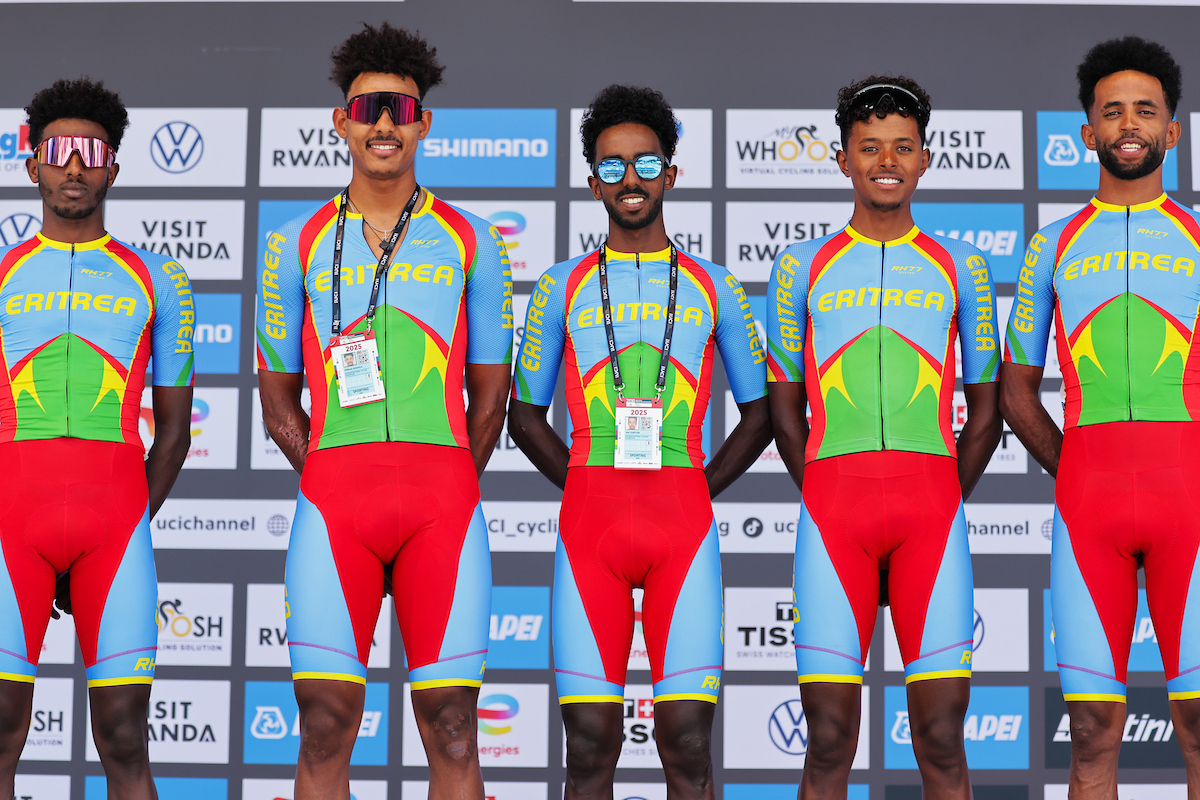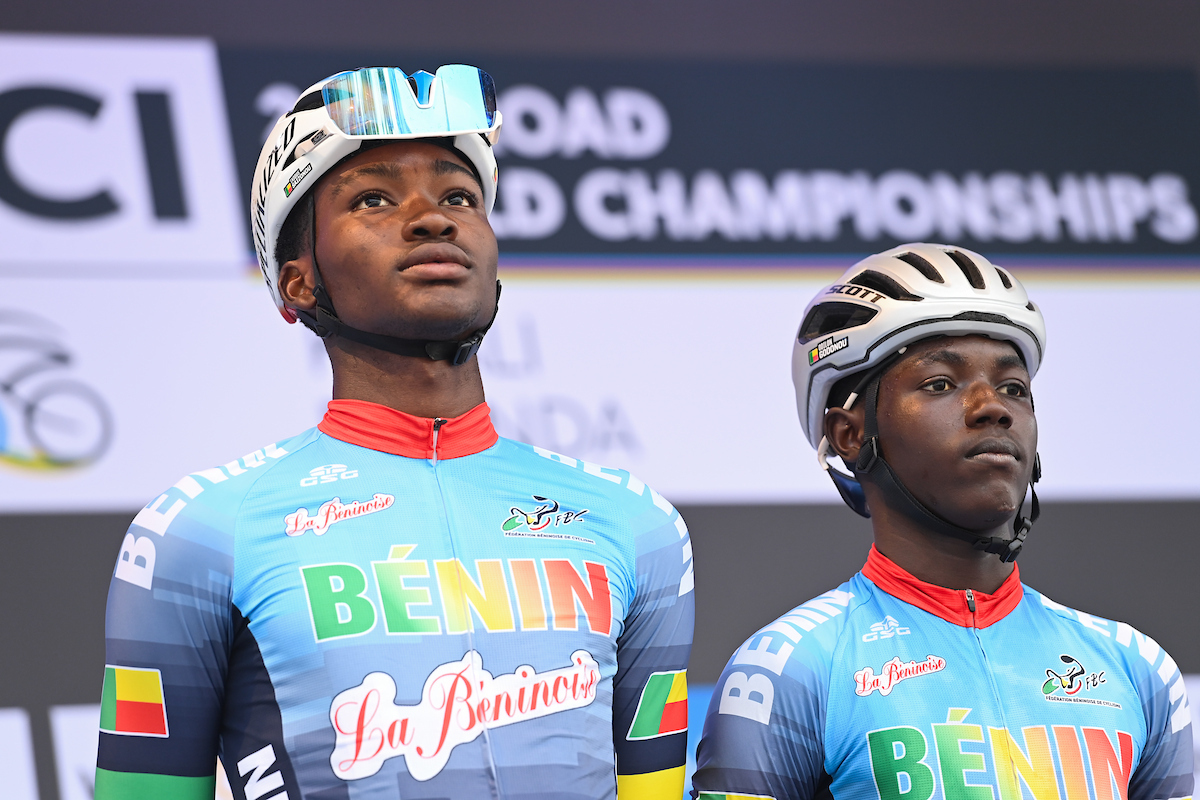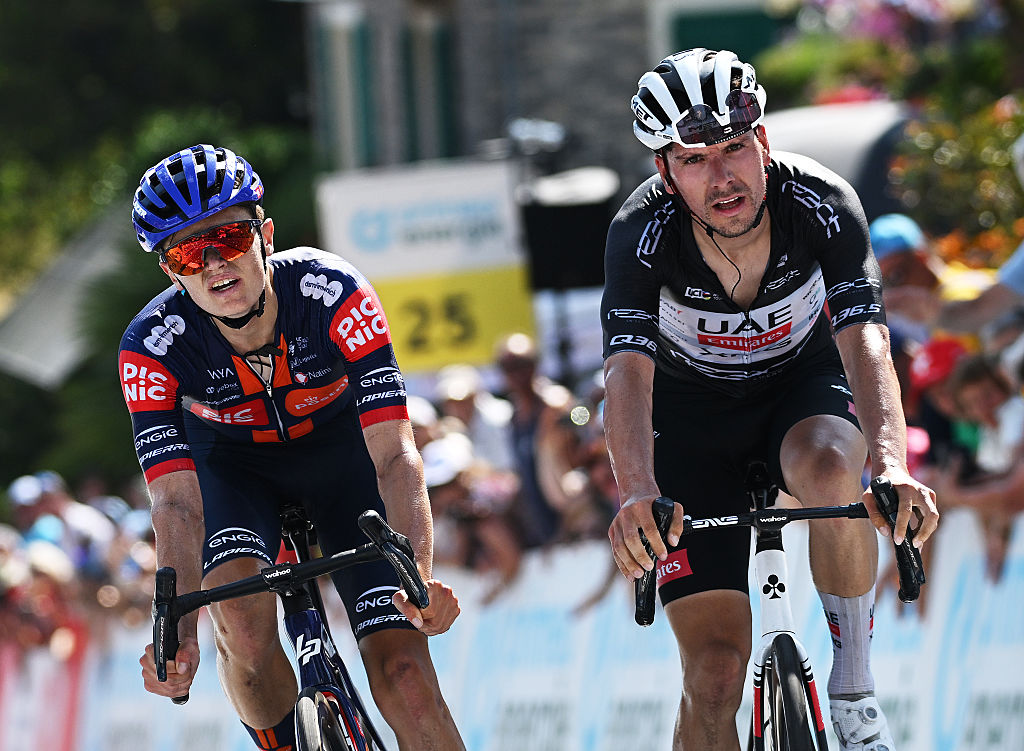'It would be nice if it gave more opportunities to the African riders' - Biniam Girmay says challenging course design made him doubt racing historic Rwanda Worlds
Girmay opines that the difficulty of the road race course makes it harder for African riders to have a chance

The latest race content, interviews, features, reviews and expert buying guides, direct to your inbox!
You are now subscribed
Your newsletter sign-up was successful
Eritrea's Biniam Girmay has spoken out about his doubts over competing at the 2025 UCI Road World Championships, a landmark event held for the first time in Africa, saying the course was too challenging and offered little opportunity for riders from competing African nations.
The 25-year-old is a multiple-time Tour de France stage winner racing for Intermarché-Wanty and the silver medallist in the under-23 elite men's race at the 2021 Worlds in Leuven. He likened the elite men's road race to the Monument Liège-Bastogne-Liège, saying the route would not suit him and, in fact, would only suit a very few select riders on the WorldTour.
"I can answer this in a quite simple way. In Liège-Bastogne-Liège, I cannot go, I never go, even in Il Lombaria, because it is quite hard and I don't want to go there just to be at the start, to be dropped, it's not nice," Girmay told the assembled press at the Kigali Convention Centre on Friday.
The majority of the Road World Championships over the last century have been held in Europe and, on rare occasions, reached North America, South America, Asia, and Oceania. However, this edition has finally reached Africa, marking a landmark moment and delivering on a long-time promise from the UCI to globalize the sport of cycling.
Girmay questioned why the sport's governing body would create one of the toughest courses in the event's history, which would cater to so few athletes.
"Especially in this kind of occasion. It's the first time in Africa. It's within reach for us, African riders, but if you see this parcours, it's never good for any African riders. Even if you say to me a name, it's really hard for everyone. It's not nice, to be honest, because it's the first time in Africa, so it might have been better to give more opportunities to the African riders because, yeah, if you see now, already in the junior time trials, everything, we don't have it because it's way harder for African riders."
The elite men's race features a 15.1km city circuits, nine at the start and six at the end, along with the additional challenge of a mid-race extension loop that boast three more climbs; Côte de Péage, which is 1.8km at 5.9%, Mount Kigali is the longest climb at 5.9km at 6.9% and peaks at 1,771 metres altitude, and the famed Mur de Kigali, which is only 400m but features unruly cobbles and is punishingly steep with an average of 11%. The peloton will race a total of 267.5km with 5,475m of elevation gain.
The latest race content, interviews, features, reviews and expert buying guides, direct to your inbox!
"It would be nice if it gave more opportunities to the African riders. So, that is why I was in doubt at the beginning of the season. It's very hard, the parcours. For me, I always like to be there and to compete or try to do something, especially for myself," said Girmay, who made a delayed decision to line up for Eritrea to support his national team in Kigali.
"Now, I always like to get a good result and make the best out of it, but at the end of the day, I am always happy to wear my national team jersey and represent my country. The national team asked me to be there to help the team, and I accepted it 100% and that is why I'm here to support my teammates."
Defending champion Tadej Pogačar and many competing athletes have spoken to the media and on social channels about how much they have been enjoying their time in Kigali, noting the historic significance of the Road Worlds being held in the African country of Rwanda.

"If you travel from a different continent, then everything is different. Africa is a really massive continent, and so we are completely different than each other. I've travelled to a few other countries in Africa that are completely different," said Girmay.
"It is an honour and a pleasure to be here in Rwanda. It is a country where they like sports and are super passionate about this sport. You see, the people are welcoming, and it's beautiful with a lot of nice places to ride a bike, of course, maybe that is why it is more attractive in this country."
Many countries throughout Africa have produced some of the top cyclists, past and present, including Girmay, Natnael Tesfatsion, Merhawi Kudus and Daniel Teklehaimanot (all from Eritrea), Tsgabu Grmay (Ethiopia), Djazilla Umwamikazi and Xaverine Nirere (Rwanda), Ashleigh Moolman Pasio, Daryl Impey, Louis Meintjes (all from South Africa), Ahmed Kebaili (Algeria), and Kim Le Court-Pienaar (Mauritius).
Girmay had a strong start to his career with three victories at the African Continental Championships held in Kigali in 2018, before progressing through the World Cycling Centre (WCC) development programme and then moving on to ProTeam Nippo Delko One Provence, and subsequently to the WorldTour with Intermarché-Wanty.
He has solidified himself as one of the fastest sprinters in the peloton, winning Gent-Wevelgem and a stage at the Giro d'Italia in 2022 and winning three stages and the points jersey at the Tour de France in 2024.
"In 2018, that was my first outside of Eritrea competition, and I won the time trial, team time trial and the road race [at the African Continental Championships]. When you are a junior, I think, you really don't know your main potential, so you can try to do everything," Girmay said.
"When you come into the bigger or WorldTour level, it is different; you just need to stick to one potential that you have, but know it is completely different than seven or eight years ago."
Girmay explained that his nation, Eritrea, is passionate about cycling and so he has had support and opportunities in the sport that some riders may not have had in other nations around the continent.
"Eritrea is one of the countries in Africa that has more interest, and cycling is part of the culture. We do have a lot of races in Eritrea, so that actually the main fact that explains why it is better than the other countries in Africa, because we really like and spend a lot of time to improve and to develop in cycling, and people are working on that," Girmay said.
"I will say that if there is more opportunity and more big investment, then that would have a lot of riders. Already, we saw a lot of good riders from different countries, including Eritrea, so even more for the future, and I hope this event will help Africa to grow."
The UCI has increased its support of the WCC satellite programmes, launching a new hub in three locations in Rwanda: Musanze, Bugesera and Rwamagana, but many athletes from African nations have emphasized the barriers they have faced, the need for more investment along with high-level training and racing opportunities. They have called on the sport's governing body to increase its action in developing cycling in African countries. Girmay added that nations require access to better baseline equipment, coaching, and nutrition.

"We just go and ride and race in a competition. Right now, it's different than 20 years ago; we are already far behind the European races. If you want to compete in the biggest events in cycling, you have to have everything, from the basic things; if you look at a bike, we are also struggling to buy a bike because there are already €14K of €15K for the best bikes. If you look here.
"I don't really know who can spend this money, or if you need someone to help you, the government needs to support the people, especially those who don't have the funds. They have to give a lot to every point, because I already see a lot of riders in different countries in Africa and the bikes are completely different," he said.
"Sometimes you see the saddle too high or too low and that can destroy you within a few months. We need to have the basic things. We don't need to have the biggest races, we just need better coaches, nutrition and the bike stuff, because if you look in Europe, there are a lot of teams that change bikes every year, and the second bike maybe they can give to support to a few countries in Africa, this might also help, a lot of riders.
"At the end of the day, also, the opportunity to race in Europe. For me, if I can tell my story, that is the only thing that helped me, and if I can see myself from different riders, me and a few guys found opportunities when we were 17-18 years old, we go to the UCI where there are a lot of things, we raced as juniors, under-23 and the moment got to the pro level we did not need to learn anymore. We just had to compete because we had already come to Europe. So, that might help to give this opportunity to Africa."
Girmay said that it's been nice to be in Kigali and to experience the World Championships, even if he doesn't believe the course suits him.
"It's always nice to race at the biggest event in the world. There is a lot of pressure on your shoulders because you really care about your country, especially since a lot of people expect more from you, which is nice on one hand, but not so nice on the other hand," he said.
"So far, so good. The last time that I was here was in 2020, so it's already been a couple of years. Since I arrived from the airport, the people are super nice, friendly and a good welcome. So far, I'm happy and everything is going well."
Subscribe to Cyclingnews to unlock unlimited access to our coverage of the first-ever UCI Road World Championships on African soil. Our team of journalists will bring you all the major storylines, in-depth analysis, and more directly from the action in Rwanda as the next rainbow jerseys are decided. Find out more.

Kirsten Frattini has been the Editor of Cyclingnews since December 2025, overseeing editorial operations and output across the brand and delivering quality, engaging content.
She manages global budgets, racing & events, production scheduling, and contributor commissions, collaborating across content sections and teams in the UK, Europe, North America, and Australia to ensure audience and subscription growth across the brand.
Kirsten has a background in Kinesiology and Health Science. She has been involved in cycling from the community and grassroots level to professional cycling's biggest races, reporting on the WorldTour, Spring Classics, Tours de France, World Championships and Olympic Games.
You must confirm your public display name before commenting
Please logout and then login again, you will then be prompted to enter your display name.
